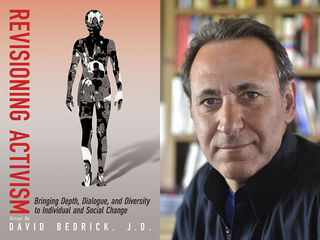Depression
What Depression May Be Telling You
New paradigms in understanding depression
Posted November 2, 2016
Many people view depression as a negative energy, a feeling inside of them that draws them downward, slows them down, thwarts their purpose and life energy. It’s something that disturbs their status quo or their desired state and, thus, naturally, they want to undo it. They want to “anti-depress” themselves, to get “back to normal.” But what if we adopt a new paradigm about depression? What if depression contains a hidden intelligence that can teach us to live in a healthier way?
It’s time we reassess the view that depression is only a bad thing and explore its nature—its moods, self-talk, and feelings to understand its meaning for our lives.
The Allopathic Viewpoint of Depression
Most of us think conventionally about our healing; we think allopathically. That means that we pathologize our problems—treat them like symptoms of an illness to be relieved, removed, gotten rid of.
For example, if I go to a doctor and have a fever, they seek to lower the fever—they treat it as if it’s not a good thing (even though a fever can be helpful in certain ways). If I have an infection, they give me an antibiotic to take away the infection—the infection is the result of a pathogen. The goal implied in our conventional thinking is to get us back to normal.
We have learned to deal with depression the same way. When we’re having an emotionally heavy experience, a downward energy, we naturally want to get rid of it. We want to be lifted back up, so we might visit various healing professionals: a therapist, medical doctor, acupuncturist, herbalist, or a nutritionist—we want to eradicate the depression as if it is a symptom indicating that there's something wrong with us. In a way there is; something’s bothering us, something is hindering our sense of wellness and normalcy. But there’s a deeper way to look at the issue, one that requires shifting the perception, the paradigm, that depression is is only a symptom of an illness.
The Deeper Intelligence Hidden in Depression: Three Stories
While allopathic thinking can be very helpful when it comes to psychological or emotional suffering, it often shames—views a disturbance to our comfort or status quo as if something's wrong with us, leading us to feel defective, even unworthy of love and acceptance. This viewpoint comes with a powerful cost.
The allopathic view of depression often fails to see depression's intelligence; it is blind to depression’s meaning and function.
Story 1: Consider the man who is driven to perform at his job and support his family. He’s doing all that he can, working 70-80 hours a week. He tells me he’s depressed. When I ask what he means, he says, "I hardly have any energy." Probing just a bit deeper into the situation, I uncover that not only is he exhausted (and interprets his reasonable exhaustion as depression), but I also learn that he really doesn’t want a lifestyle that consists of working 80 hours a week. In this way, the depression is not only an illness needing to be relieved, but also carries a meaning: that the man is living an unhealthy lifestyle. We could say that his spirit is sick of the lifestyle, and the depression is its way of communicating that it needs rest as well as a change of routine.
Our bodies often speak to us about our needs through physical and emotional maladies.
In this case, the depression is functioning as a healing medicine, a way for him to use the “down” that he feels to stop and reassess his life and orient him to make necessary changes that will bring him a greater sense of well-being.
Story 2: A second person says to me, "I'm really depressed." I respond, "How do you know?" He says, "I feel really down." I say, "Let's go deeper into your down feeling." From there, I have him sit back, close his eyes, and tell me how he feels. “I feel like I could just lie down and do nothing.” I ask, "What's your nothing like?" I'm asking that because I'm interested in validating his experience, not shaming it. He says, "It's like I'm just floating. I feel like I'm on the river, being taken for a ride."
In this example, there is a kind of floating in his depression, a desire to let life take him on the river, but he doesn’t know how to lean into and trust life, be guided by it, instead of trying to control it. If I tell him, "Depression is bad; I want to anti-depress you," then I'm inadvertently telling him that the deep desire to “float with life”—something he doesn't yet know about—is not a good thing. I’m throwing away the baby with the bath water: throwing away "floating on the river" with the depression.
Story 3: Finally, consider the woman who describes her depression as a feeling of being pressed or held down. Perhaps she's being pressed down (depressed) by the culture, her family, or the social conditions that make her life harder. Maybe she's being misused or abused by a family member or treated by the culture at large like a person who doesn't have much power, doesn't deserve much respect. There is a real outer condition and attitude that literally de-presses her.
When I ask this woman about feeling “pressed down,” she evidences some frustration or resentment. She doesn’t want to be pressed down; in her frustration is some resistance, some fight. In an attempt to help her tap into her emotions on a more intense level, I press down on her shoulders physically and say, "I'm not going to let you up." Instead of helping her find the meaning of going down, she needs to learn more about her resistance to going down, her fight.
Sometimes when I push on a person’s shoulder like this, they push back physically. They are accessing the strength they need to stand up to the forces that de-press them. Maybe they’re tired of being treated poorly, being bossed around, or not doing the things they really want to do in life. When they push back, they’re accessing their power.
Some people need the power inside their depression in order to fight against the forces that oppress, or depress, them.
If I were to try to anti-depress this woman too quickly, I would miss the fact that in her depression is the very power she needs to make a better life. I might make her momentarily feel better, but I would fail to connect her with the power she needs to change her life. In treating people like something is wrong with their depression, I inadvertently treat the power and resistance in them as also wrong. In short, I shame this aspect of their depression.
Approaching depression in a non-shaming way instills the confidence people need to begin to trust the direction and wisdom in those difficult feelings, not be afraid to dig into them for a closer look and pull out the healing gems hidden within. This level of introspection leaves a person with the self-love and understanding needed to keep their mental scales properly balanced. They’re able to see all of their feelings and experiences—not just the good ones—as playing a vital part in their emotional well-being. This revolutionary thinking will not only allow optimal self-acceptance, but it will also open the way for expanded respect and compassion for others’ emotional states, an ideal place for society to reside if shaming is to be eliminated among us.

For more information, visit davidbedrick.com.




